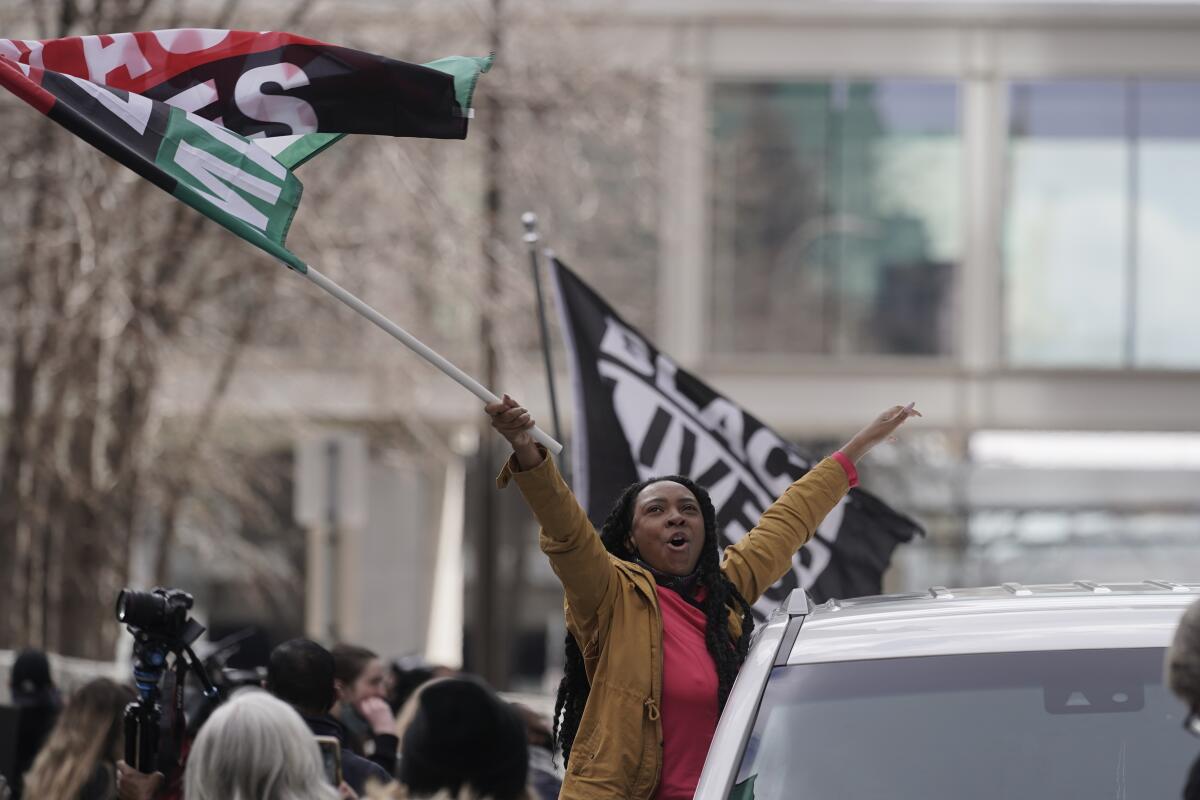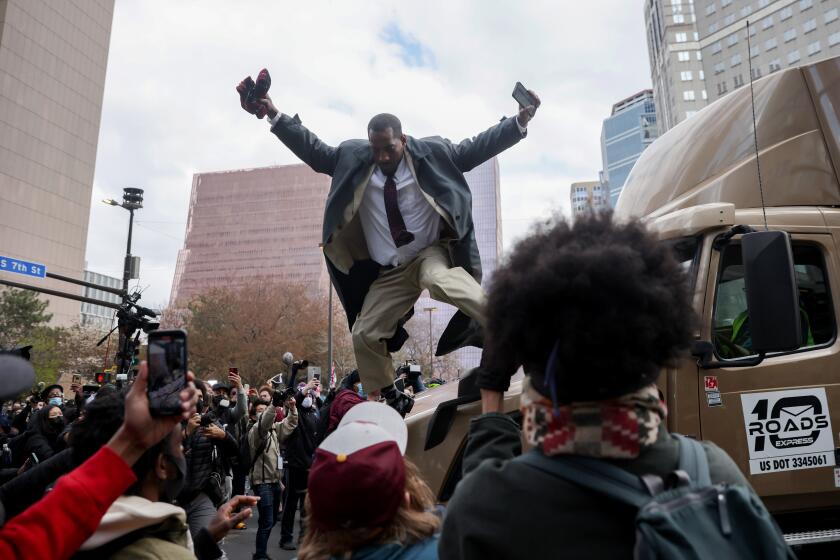Column: Finally, at least for this moment, justice prevailed in Minneapolis

- Share via
It’s a relief, a sign of progress and an affirmation of the energy and outrage that drove the demand for justice.
But the conviction of Derek Chauvin does not mean our broken system is fixed. Let’s not assign it more power than it deserves.
I’m grateful that, unlike the jury in the trial against the officers who beat Rodney King, these 12 jurors did indeed believe what they’d seen on that devastating video of Chauvin stealing the life of George Floyd.
But this rare court victory is not a universal declaration of the value of Black lives. It is not — despite how well the sound bite plays — a message to Black people that we can now move freely, without worry, through our daily lives.
The horror of this case has taken up residence in people like me — conditioned to hope, but prepared for disappointment.
I spent Tuesday morning staring at my computer screen for hours, not writing much of anything. I was too busy refreshing my “breaking news” feed and wondering what the jury could possibly still be arguing about.
I’d stepped away for lunch when my phone lit up with texts: The jurors had come to a decision. My heart started racing and pounding so hard, I wondered if I might be having a heart attack.
Reaction to verdict in death of George Floyd
They had deliberated for less than 12 hours before finding Chauvin guilty of all three charges he faced. But that had felt to me like an eternity, as I sat silently nursing anxieties I couldn’t talk about.
My colleagues and neighbors all seemed so optimistic: How could the jury not convict, they asked, given the strength of the prosecution and the emotional heft of the video? They had faith, where I had only dread.
The killing, the charges and the criminal proceedings had reopened a wound I thought had healed long ago.
The Chauvin prosecution got under my skin in a way I hadn’t experienced since four Los Angeles police officers were tried — and acquitted — 29 years ago this month for the videotaped beating of King.
Ever since this case went to the jury, I could think of little else. I passed the last four days in a fog, feeling worried, tense and inexplicably unsafe whenever I had to leave the house.
I thought I’d learned to keep my emotions in check.
But I couldn’t help but remember that King video, which also raised outrage around the world. Back then, I allowed myself to believe that no jury could deny the horror of what we all had seen. King had been stomped, kicked and beaten by a mob of officers.
Then the “not guilty” verdicts came in.
And to this day, it is not the horror of the ensuing riots that I remember most. It’s the heartbreak of the verdicts. Listening to them on a television in the L.A. Times newsroom, I felt physical pain; the words delivered a blow that curdled my stomach, weakened my knees and made me feel dizzy.
My colleagues went silent, and suddenly I felt exposed and alone. Why was I the only one crying?
This time I knew I wasn’t the only one on my side of the line, unwilling to consider guilty verdicts a foregone conclusion.
In the run-up to the verdict announcement on CNN, there was Don Lemon trying to explain to Jake Tapper why he wasn’t willing to predict a conviction, and he got Van Jones to cosign that stance.
We share the same lack of faith because we bear the same battle scars.
USC law professor Jody Armour normalized that for me when I called him after the verdict. “We, as Black Americans, have been victims of gaslighting so often by white America, through its representatives in the jury box,” he explained, ticking off a list of police abuse trials in which juries failed to convict.
He also echoed my feelings about how the King verdict rendered us unable to trust the justice system to deal with police abuse.
“We’d seen them on videotape beating Rodney King savagely. And when the beating got to the jury … they told Black Americans they could not trust their own eyes.
“That why you and I and all of us on some level are uptight,” Armour said. “It’s not some irrational fear we have; it’s a very rational response to what we have seen. We’ve grown accustomed to acquittals, no matter how compelling the evidence.”
I realize now how damaging that has been, but on Tuesday a glimmer of hope crept in, as the judge polled the 12 jury members after the verdicts were read.
As he called their jury numbers individually, each juror called out “Yes” when asked if they agreed with the convictions.
And there was something about the strength in those voices, the hints of their accents, the proof of their solidarity that broke through my fear and my cynicism.
I cried at my desk, just as I had 29 years ago. But these tears were fueled by hope, not betrayal.
More to Read
Sign up for Essential California
The most important California stories and recommendations in your inbox every morning.
You may occasionally receive promotional content from the Los Angeles Times.











